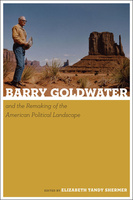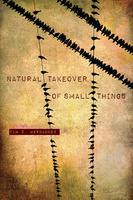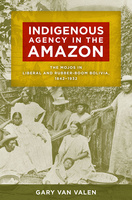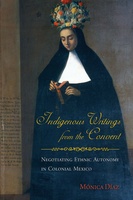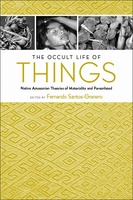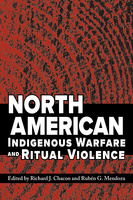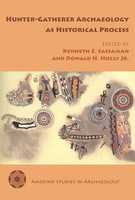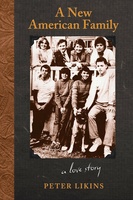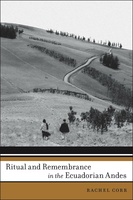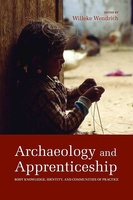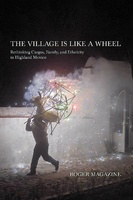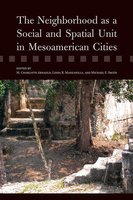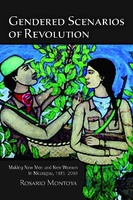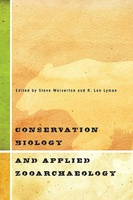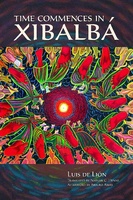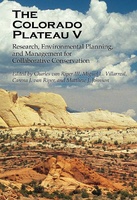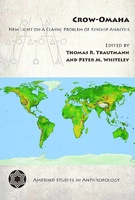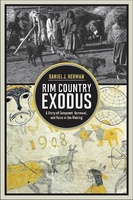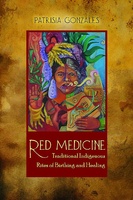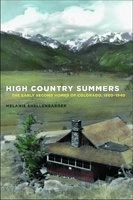The University of Arizona Press is the premier publisher of academic, regional, and literary works in the state of Arizona. They disseminate ideas and knowledge of lasting value that enrich understanding, inspire curiosity, and enlighten readers. They advance the University of Arizona’s mission by connecting scholarship and creative expression to readers worldwide.
Showing 761-780 of 1,705 items.
Barry Goldwater and the Remaking of the American Political Landscape
Edited by Elizabeth Tandy Shermer
The University of Arizona Press
Barry Goldwater lost the race for the presidency in 1964, but his conservative agenda sparked a movement that has had profound and far-reaching effects on American politics and society. This is a long-overdue reconsideration of the life, times, and legacy of a polarizing politician who is as reviled as he is revered.
Natural Takeover of Small Things
The University of Arizona Press
Natural Takeover of Small Things is a collection of poetry that offers an unflinching view of “California’s Heartland,” the San Joaquin Valley. In his distinctive, lyrical, pull-no-punches style, Tim Z. Hernandez offers a glimpse of the people, the landscape, the rhythm, and the detritus of the rural West. As Hernandez peels back the façade of the place, he reveals that home is not always where the heart is.
Indigenous Agency in the Amazon
The Mojos in Liberal and Rubber-Boom Bolivia, 1842–1932
The University of Arizona Press
Indigenous Agency in the Amazon explores the underexamined story of indigenous people who accepted Jesuit mission life and then, nearly two centuries later, withstood the challenges of the rubber boom and the imposition of European liberalism.
Indigenous Writings from the Convent
Negotiating Ethnic Autonomy in Colonial Mexico
By Mónica Díaz
The University of Arizona Press
Indigenous Writings from the Convent examines ways in which indigenous women participated in one of the most prominent institutions in colonial times—the Catholic Church—and what they made of their experiences with convent life.
The Occult Life of Things
Native Amazonian Theories of Materiality and Personhood
Edited by Fernando Santos-Granero
The University of Arizona Press
Combining linguistic, ethnological, and historical perspectives, the contributors to this volume draw on a wealth of information gathered from ten Amerindian peoples belonging to seven different linguistic families to identify the basic tenets of what might be called a native Amazonian theory of materiality and personhood.
North American Indigenous Warfare and Ritual Violence
Edited by Richard J. Chacon and Rubén G. Mendoza
The University of Arizona Press
This groundbreaking book presents clear evidence—from multiple academic disciplines—that indigenous populations engaged in warfare and ritual violence long before European contact.
Hunter-Gatherer Archaeology as Historical Process
Edited by Kenneth E. Sassaman and Donald H. Holly
The University of Arizona Press
Combining the latest empirical studies of archaeological practice with the latest conceptual tools of anthropological and historical theory, this volume seeks to set a new course for hunter-gatherer archaeology.
A New American Family
A Love Story
By Peter Likins
The University of Arizona Press
This poignant but ultimately empowering memoir tells the story of Peter Likins, his wife Patricia, and the six children they adopted in the 1960s, building a family beset by challenges that ultimately strengthened all bonds.
Ritual and Remembrance in the Ecuadorian Andes
By Rachel Corr
The University of Arizona Press
Ritual and Remembrance in the Ecuadorian Andes is, in its portrayal of Salasacan religious culture, both thorough and all-encompassing. Sections of the book cover everything from the performance of death rituals to stories about Amazonia as Salasacans interacted with outsiders—conquistadors and camera-toting tourists alike. Corr also investigates the role of shamanism in modern Salasacan culture, including shamanic powers and mountain spirits, and the use of reshaped, Andeanized Catholicism to sustain collective memory.
Archaeology and Apprenticeship
Body Knowledge, Identity, and Communities of Practice
Edited by Willeke Wendrich
The University of Arizona Press
Apprenticeship is broadly defined as the transmission of culture through a formal or informal teacher–pupil relationship. This collection invites a wide discussion, citing case studies from all over the world and yet focuses the scholarship into a concise set of contributions. This book also examines apprenticeship in archaeology against a backdrop of sociological and cognitive psychology literature, to enrich the understanding of the relationship between material remains and enculturation.
The Village Is Like a Wheel
Rethinking Cargos, Family, and Ethnicity in Highland Mexico
The University of Arizona Press
This manifesto proposes a radical but commonsensical change to how anthropologists study people whose value systems are not their own. It focuses on rural highland peoples in Mexico, but its larger argument is that anthropologists’ approaches can distract them from what is truly important to the people whose lives they study.
The Neighborhood as a Social and Spatial Unit in Mesoamerican Cities
The University of Arizona Press
Recent realizations that prehispanic cities in Mesoamerica were fundamentally different from western cities of the same period have led to increasing examination of the neighborhood as an intermediate unit at the heart of prehispanic urbanization. This book addresses the subject of neighborhoods in archaeology as analytical units between households and whole settlements.
Gendered Scenarios of Revolution
Making New Men and New Women in Nicaragua, 1975–2000
The University of Arizona Press
Employing an approach that combines political economy and cultural analysis, Montoya argues that the Sandinistas collapsed gender contradictions into class ones, and the Sandinistas increasingly ruled by mandate as vanguard party instead of creating the participatory democracy that they professed to work toward. This book offers a reinterpretation of the revolution’s supposed failure.
Conservation Biology and Applied Zooarchaeology
Edited by Steve Wolverton and R. Lee Lyman
The University of Arizona Press
This book shows how zooarchaeology can productively inform conservation science. It both introduces applied zooarchaeology to conservation biologists and offers case studies that use animal remains from archaeological and paleontological sites to provide information that has direct implications for wildlife management and conservation biology today.
Time Commences in Xibalbá
The University of Arizona Press
Time Commences in Xibalbá tells the story of a violent village crisis in Guatemala sparked by the return of a prodigal son, Pascual. He had been raised tough by a poor, single mother in the village before going off with the military. When Pascual comes back, he is changed—both scarred and “enlightened” by his experiences. To his eyes, the village has remained frozen in time. After experiencing alternative cultures in the wider world, he finds that he is both comforted and disgusted by the village’s lingering “indigenous” characteristics.
The Colorado Plateau V
Research, Environmental Planning, and Management for Collaborative Conservation
The University of Arizona Press
This volume, the fifth from the University of Arizona Press and the tenth overall, focuses on adaptation of resource management and conservation to climate change and water scarcity, protecting biodiversity through restructured energy policies, ensuring wildlife habitat connectivity across barriers, building effective conservation networks, and exploring new opportunities for education and leadership in conservation science.
Crow-Omaha
New Light on a Classic Problem of Kinship Analysis
Edited by Thomas R. Trautmann and Peter M. Whiteley
The University of Arizona Press
Why do people in a few societies scattered around the globe call relatives of different generations by the same terms? This question has perplexed anthropologists since 1871. A successor to the landmark 1998 book Transformations of Kinship, this volume includes the latest work on the “Crow-Omaha problem” from the world’s leading scholars.
Rim Country Exodus
A Story of Conquest, Renewal, and Race in the Making
The University of Arizona Press
Herman examines the complex, contradictory, and very human relations between Indians, settlers, and Federal agents in late nineteenth- and early twentieth-century Arizona—a time that included Arizona’s brutal Indian wars. But while most tribal histories stay within the borders of the reservation, Herman also chronicles how Indians who left the reservation helped build a modern state with dams, hydroelectricity, roads, and bridges. With thoughtful detail and incisive analysis, Herman discusses the complex web of interactions between Apache, Yavapai, and Anglos that surround every aspect of the story.
Red Medicine
Traditional Indigenous Rites of Birthing and Healing
The University of Arizona Press
Patrisia Gonzales addresses “Red Medicine” as a system of healing that includes birthing practices, dreaming, and purification rites to re-establish personal and social equilibrium. The book explores Indigenous medicine across North America, with a special emphasis on how Indigenous knowledge has endured and persisted among peoples with a legacy to Mexico.
High Country Summers
The Early Second Homes of Colorado, 1880–1940
The University of Arizona Press
High Country Summers considers the emergence of the “summer home” in Colorado’s Rocky Mountains as both an architectural and a cultural phenomenon. Writing with affection and insight, Melanie Shellenbarger shows that these summer residences crossed boundaries of class, race, and gender—and helped shape our ideas about the American West.
Stay Informed
Subscribe nowRecent News


